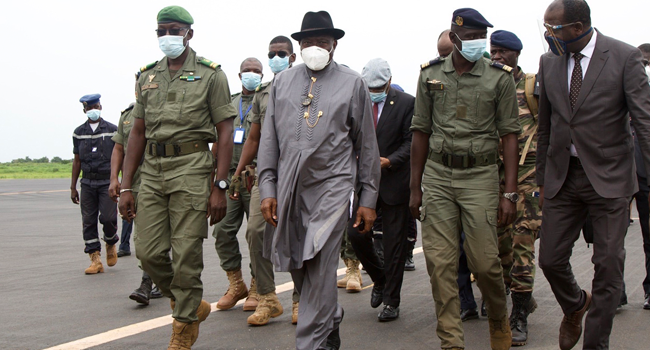A delegation of West African leaders headed by former Nigerian President, Dr. Goodluck Jonathan, has arrived in the Malian capital, Bamako on a mission to try to push for a speedy return to civilian rule after a military coup in the troubled nation.
The delegation plans to meet members of the new junta as well as ousted president Ibrahim Boubacar Keita.
Rebel soldiers seized Keita and other leaders after a mutiny on Tuesday, dealing another deep blow to a country already struggling with a brutal Islamist insurgency and widespread public discontent over its government.
Mali’s neighbours have called for Keita to be reinstated, saying the purpose of the delegation’s visit was to help “ensure the immediate return of constitutional order”.
“ECOWAS appreciates what is happening in Mali and ECOWAS wants the best for the country,” Jonathan said after his arrival.
Former Nigerian President Goodluck Jonathan (C) walks at the International Airport in Bamako upon his arrival on August 22, 2020 next to by Malick Diaw (4R), the Vice President of the CNSP (National Committee for the Salvation of the People) ANNIE RISEMBERG / AFP
We’re going to discuss with all stakeholders and I think at the end of the day we’ll come out with something that is good for the country, good for ECOWAS and good for the international community.”
A delegation official said they would meet members of the junta and later Keita, who is being held with prime minister Boubou Cisse in Kati, a military base northwest of Bamako where the coup was unleashed.
Adding to the international pressure, the United States on Friday suspended military aid to Mali, with no further training or support of the Mali armed forces.
‘We won’
But thousands of jubilant Malians took to the streets of Bamako on Friday to celebrate the toppling of Keita, who was reelected in 2018 but became the focus of widespread discontent.
The crowds gathered in Bamako’s central square draped in the national flag and blasting on vuvuzela horns.
The rally, originally organised as an anti-Keita protest by a loose coalition that has led months of mass rallies against him, was recast to “celebrate the victory of the Malian people”.
“I am overjoyed! We won,” said Mariam Cisse, 38.
Speaking at the rally Ismael Wague, spokesman for the junta which calls itself the National Committee for the Salvation of the People, paid tribute to the public.
“We merely completed the work that you began and we recognise ourselves in your fight,” he said.
‘Transitional council’
The junta has said it welcomes the ECOWAS visit but has not talked of restoring Keita to power.
“A transitional council, with a transitional president who is going to be either military or civilian” would be appointed, Wague told France 24 television Thursday.
Keita won election in a landslide in 2013, presenting himself as a unifying figure in a fractured country, and was re-elected in 2018 for another five-year term.
But he failed to make headway against the jihadist revolt that has left swathes of the country in the hands of armed Islamists and ignited ethnic violence in the country’s volatile centre.
Thousands of UN and French troops, along with soldiers from five Sahel countries, have been deployed to try to stem the bloodshed.
In a sign of the continuing challenge facing the country, four soldiers were killed by an explosive device in the center of the country.
The ECOWAS visit to Mali comes after the UN’s peacekeeping mission in the country said a human rights team had gained access to the ousted president and other detainees on Thursday.
A junta member said the coup leaders had released former economy minister Abdoulaye Daffe and Sabane Mahalmoudou, Keita’s private secretary, calling the move “proof that we respect human rights”.
While Keita and Cisse have no television, radio or phone, other detainees are in a training centre, where they are sleeping on mattresses and have a TV, according to witnesses to the visit.
The 75-year-old ousted president “looked tired but relaxed,” they said, describing his conditions as “acceptable”.
Tuesday’s coup was the second in eight years, and has heightened concern over regional stability as its jihadist insurgency that now threatens neighbouring Niger and Burkina Faso.
Credit: AFP






Leave a Reply